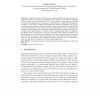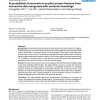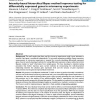309 search results - page 22 / 62 » Clustering-Based Framework for Comparing fMRI Analysis Metho... |
134
click to vote
CVPR
2010
IEEE
15 years 3 months ago
2010
IEEE
Most tracking algorithms implicitly apply a coarse segmentation of each target object using a simple mask such as a rectangle or an ellipse. Although convenient, such coarse segme...
127
click to vote
JUCS
2008
15 years 2 months ago
2008
Abstract: Adaptive behavior and learning are required of software agents in many application domains. At the same time agents are often supposed to be resource-bounded systems, whi...
122
Voted
BMCBI
2008
15 years 2 months ago
2008
Background: The functional characterization of newly discovered proteins has been a challenge in the post-genomic era. Protein-protein interactions provide insights into the funct...
148
click to vote
BMCBI
2006
15 years 2 months ago
2006
Background: The small sample sizes often used for microarray experiments result in poor estimates of variance if each gene is considered independently. Yet accurately estimating v...
146
click to vote
ECCV
2006
Springer
15 years 6 months ago
2006
Springer
Abstract. In this paper, we describe an unsupervised learning framework to segment a scene into semantic regions and to build semantic scene models from longterm observations of mo...



